BMW X3 vs Mercedes GLC: 2024 Comparison

The Mercedes-Benz GLC-Class and BMW X3 are two of the most popular luxury SUVs, let alone the compact SUV segment in particular. Hailing from two of the most recognizable and respected luxury brands, it’s not surprising that car shoppers so frequently turn to the GLC and X3 when seeking a more premium small SUV. That does not mean you should only look at this pair (look for alternatives at the bottom of this comparison rundown), but they are unquestionably solid choices.
Of all the differences between them, though, perhaps the one most important to bring to the forefront is that the Mercedes GLC was redesigned for the 2023 model year whereas the X3 dates back to 2018 with a significant update for 2022. That means one is among the newest in the segment, while the other is among the oldest (the Audi Q5 is of an equal vintage). We’re not sure how much this really impacts the comparison below for the 2024 model year, but in terms of the X3 at least, it’s probably good to know that you’ll be missing out on an all-new model in one or two model years.
Below you’ll find our answers to a variety of questions asking which of the X3 and GLC are better in certain respects. Overall, we’d choose the GLC, but the below categories should highlight where one might be superior for your particular priorities.
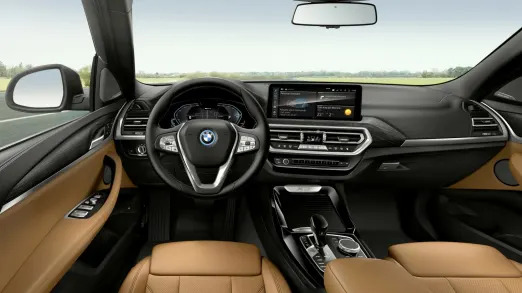
Which has a nicer interior?
Winner: Mercedes GLC
We’d say the GLC’s more recent redesign benefits here, but the last-generation GLC had a nicer interior than the X3, too. The new one, however, manages to stand out in terms of both technology and traditional luxury. The broad swath of wood or other trim across the dash, the clicky circular air vents and touchscreen rising out of the center console are equal parts elegant and cool. If you’re looking for a compact SUV that looks and feels deserving of the term “luxury vehicle,” it’s hard to think of a more convincing entry.
By contrast, the X3 has a more old-school BMW aesthetic that is rather technical in appearance. The quality is high, in appearance and materials, but in a way more indicative of high-end electronics. It certainly does have the style or polish of BMW’s more recent efforts, including the X1 below it (in fact, that’s not a bad choice to consider instead of the X3).
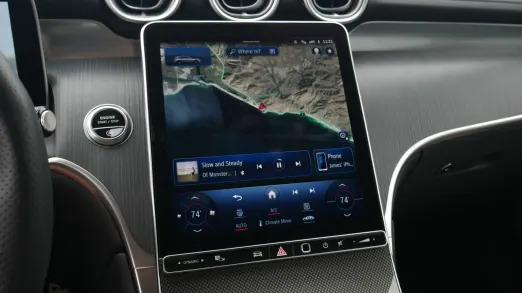
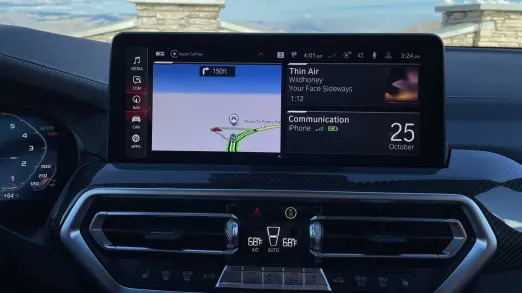
Which has better infotainment technology?
Winner: Mercedes GLC
If we’re talking screen size, this is no contest: the GLC’s standard touchscreen measures 12.3 inches to the BMW’s 10.3-inch unit, which is also placed farther away. The Mercedes digital instrument panel is bigger, too, with multiple vibrant designs compared to the odd, underutilized one-look-fits all of the BMW. In terms of the functionality, the X3 at least has the older iDrive7 touch interface that was greatly superior to the iDrive8 that would come after it (though not as good as iDrive9 in the new X1). This means if may be a bit easier to use than the Mercedes MBUX system, but both have rather steep learning curves, and we’ve become acclimated to MBUX with time and appreciate its various distinctive features.
Which is safer?
Winner: Tie
The Insurance Institute for Highway Safety named both SUVs a Top Safety Pick+ for their best-possible crash test scores, plus sufficiently high scores for its headlights and frontal crash prevention system (the GLC’s Driver Assistance package upgrades get a slightly higher score than the standard systems).
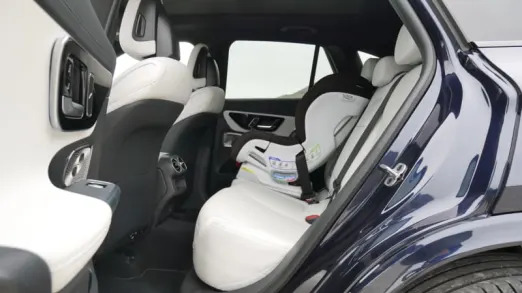
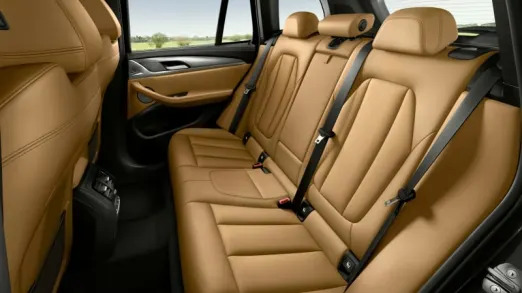
Which has the bigger back seat?
Winner: Mercedes GLC
The GLC is basically the same length overall compared to the X3, but having an extra inch of wheelbase helps it have an extra inch of back seat legroom. Neither is among the roomiest in the segment, though. If that’s important, look to the Acura RDX, Volvo XC60 or stepping up to a Lexus RX or Jaguar F-Pace.
Which has more cargo capacity and functionality?
Winner: Mercedes GLC
The answer to this question is far more complicated than it should be.
If you just looked at the specs, you’d see the X3 has 28.7 cubic-feet while the GLC has 21.9. Easy conclusion, right? Wrong. Mercedes measures its cargo areas differently, with the result being it actually has more space than its rather paltry figure would suggest. Our luggage test of the GLC revealed it could seven suitcases with room to spare, or more than everything in the segment except the RDX and XC60.
The X3 is complicated in its own way. That 28.7 cubic-feet is for an X3 without a spare tire. If you opt for a spare tire, it has to go somewhere, so the cargo floor is awkwardly raised several inches to accommodate the tire below. Our X3 luggage test (with spare tire) showed it could just barely fit five suitcases plus an overnight bag. We’re not quite sure what the results would be with the lower floor, but it certainly wouldn’t be substantially better than the GLC.
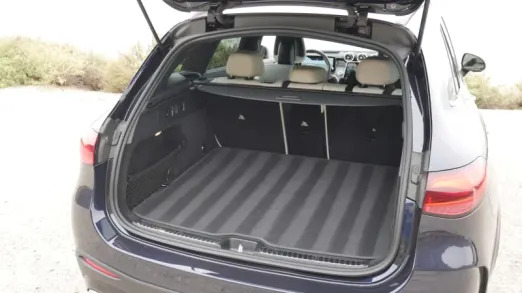
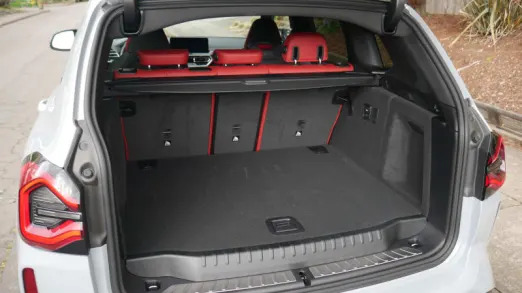
Which gets better fuel economy?
Winner: Mercedes GLC
The GLC’s mild-hybrid powertrain is likely beneficial here as it’s considerably more efficient. The rear-drive GLC 300 returns an excellent (for a luxury SUV) 29 mpg combined, while the all-wheel-drive GLC 300 4Matic returns 27. The comparable X3 sDrive30i and xDrive30i return 25 and 24 mpg combined, respectively.
Fuel economy for the high-performance AMG GLC 43 is 21 mpg combined. The X3 M40i returns 23 mpg combined, so there’s one in the MPG Win Column for BMW.
Finally, if you care about fuel economy, don’t even bother with the GLC 63 or X3 M.
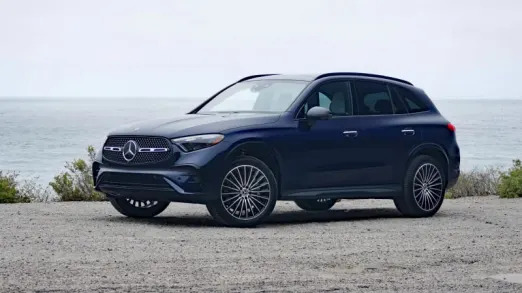
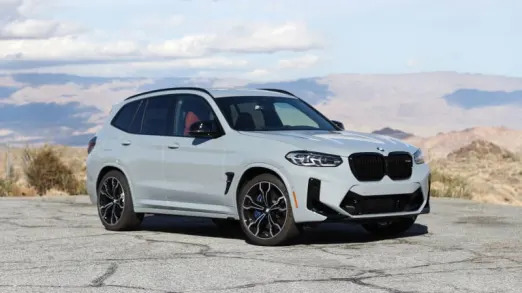
Which is more powerful?
Winner: Mercedes GLC
Both are offered in three models that correspond with a different engine. The GLC wins every time.
The volume-selling GLC 300 has a turbocharged 2.0-liter inline-four with a mild-hybrid system that all together produce 258 horsepower and 295 pound-feet of torque. The comparable BMW sDrive30i and xDrive30i (the s and x refer to rear- versus all-wheel drive) have a turbocharged 2.0-liter inline-four good for 248 hp and 258 lb-ft.
The AMG GLC 43 gets a totally different 2.0-liter turbo-four that pumps out a wild 416 hp and 369 lb-ft. The BMW X3 M40i has a 3.0-liter turbocharged inline-six with its own mild-hybrid system. It produces 382 hp and 365 lb-ft of torque. That’s obviously less than the AMG, but manufacturer-estimated 0-60-mph times indicate the BMW getting there in 4.4 seconds versus 4.7 for the Benz.
Finally, the AMG GLC 63 S E Performance has that same bonkers 2.0-liter turbo-four, but with a “performance” hybrid system that upgrades “bonkers” to an “absurd” 671 hp and 752 lb-ft of torque. In a compact SUV! AMG says it’ll hit 60 in 3.4 seconds. The X3 M has a 3.0-liter twin-turbo inline-six available in two flavors. The standard version produces 473 hp and 457 lb-ft, and hits 60 in 3.9 seconds. The X3 M Competition has 503 hp, 479 lb-ft and a 3.7-second 0-60 time.
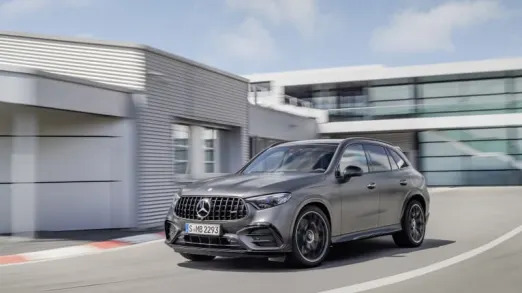
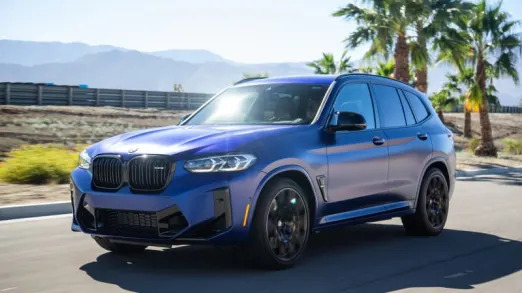
Which is better to drive?
Winner: Mercedes GLC
We have not driven the new AMG models and have minimal experience with the X3 M40i, so let’s stick with the volume-selling models of each. Now, conventional wisdom would be that the BMW would be the sharper, driver-oriented choice whereas the Mercedes will be the more comfort-tuned luxury cruiser. Not so. If you’re looking for a sporty compact SUV, the regular GLC 300 is a shockingly adept and even fun handler. It truly impressed on our mountain road test route, flicking between tight corners with poise and agility. The steering is lighter in effort (though does tighten up a bit in Sport), but feedback is sufficient for the task given this segment of vehicle. If anything, the GLC’s handling capability is overkill considering it almost certainly contributes to a constantly busy ride quality. The suspension just doesn’t feel like there’s enough travel, as opposed to some vehicles that simply could use smaller wheels. In this way, the GLC is actually a lot like the BMW X3, which similarly prioritizes handling over ride comfort – it just doesn’t do as good of a job of it. We also find its sport-tuned suspension to be unnecessarily firm.
Which is more comfortable?
Winner: Tie
As long as you avoid the X3’s sport suspension option, neither of these choices that put the S in SUV are going to provide a supple driving experience indicative of their bigger, more expensive brand mates. We generally prefer BMW’s seats and driving position to that of Mercedes, but that’s also an awfully subjective criterion.
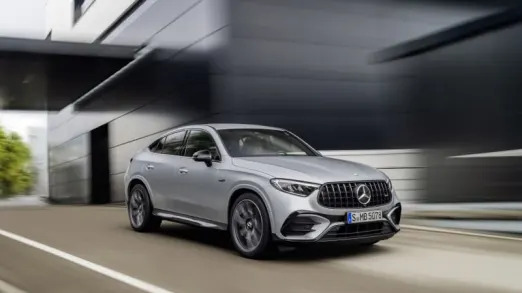
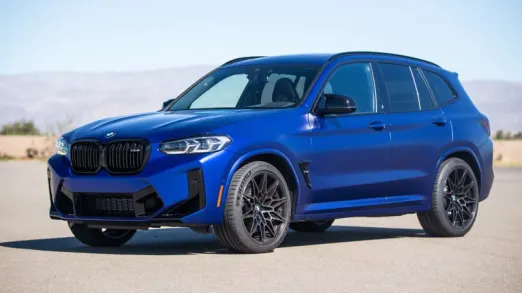
GLC 63 S E Performance Coupe and X3 M Competition
Are there versions that stand out more than others?
Winner: Tie
Remember that whole thing about the AMG GLC 63 producing over 600 hp and 700 lb-ft of torque? Yeah, that would be pretty special. Yet, the X3 M Competition is special in its own right. Both also offer “coupe” body styles with a chopped roofline at the rear, although the X3’s is officially known as the X4.
When was the last time they were redesigned?
Winner: Mercedes GLC
The GLC was redesigned for 2023, although it should be noted that its underlying platform is shared with the previous-generation GLC. The X3 stretches back to 2018 with a substantial update made for 2022.
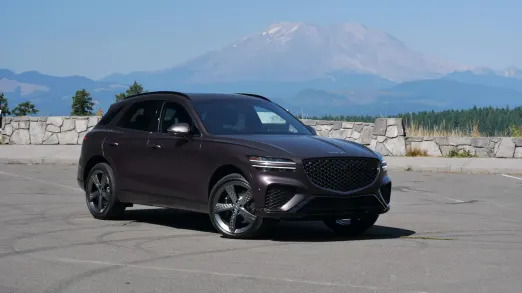
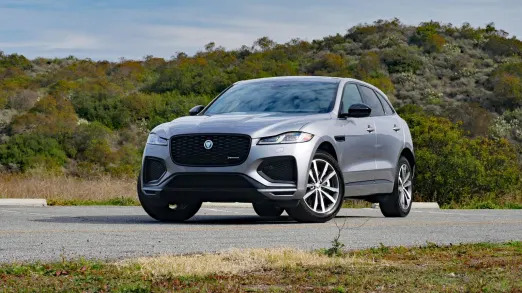
Are there other competitors to consider?
Given how many times you read “Mercedes GLC” written next to “Winner” above, it probably shouldn’t come as a surprise that we prefer it overall to the X3. Furthermore, we consider the GLC to be one of the top choices in the segment, but not so the X3. Other top choices include the Genesis GV70 and Volvo XC60, while those with a higher budget seeking a sportier drive, the Porsche Macan and Jaguar F-Pace are intriguing choices.





